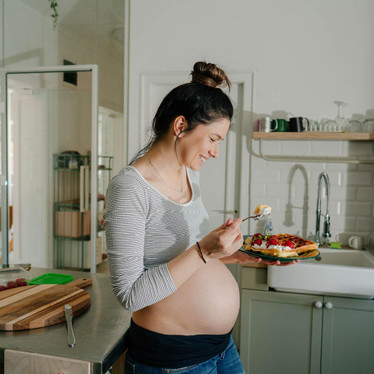How can you ensure the best nutrition for your growing baby? It often feels like a bit of a minefield trying to navigate all the information. However, it is worth getting it right as there is more and more research showing that the mother’s health and in particular nutrition, can have profound and long-lasting effects on the developing fetus, child and even into adulthood. The World Health Organisation has even coined a phrase to address the time in the womb and first two years: “the first 1000 days” of which the first 365 are while the baby is developing in the mother’s uterus.
A balanced diet which contains protein, carbohydrates and fats is important and although that sounds obvious, many women will be on newer types of diets where one food group is restricted or not consumed at all. Time to stop the fad diet when you are pregnant! Overall it is recommended women eat:
A serving is an amount that can fit in the palm of your hand. Pregnant women are more likely to get constipated and can develop diabetes during pregnancy. Both of these conditions can be reduced with a high fibre diet. It's recommended that women swap out items like white bread for wholemeal bread and eat plenty of vegetables with skins on if scrubbed.
Two to three serves of fish a week is also recommended during pregnancy. This allows for a good intake of short chain fatty acids which are essential for the baby’s brain and nerve development. There is a concern that long-lived fish (eg tuna) could result in a risk of heavy metal intake and should be avoided. For women who do not eat fish or have an inadequate intake, supplements can be taken. There are supplements from an algal source available which are suitable for all women including vegetarians, and since algae are the source of the fatty acids, there is no risk of heavy metals.
So how about if you don’t eat meat? Meat provides good levels of iron which is important for making red blood cells but also for building cells in the fetus. When low in iron, or enough is not consumed in the diet, an iron supplement is recommended. Those women who are vegan or avoid dairy for reasons of lactose intolerance should consider a calcium supplement. Many women will use a milk substitute such as soy or almond milk, but these do not have as much calcium as dairy milk. Some women who limit both meat and dairy intake will also need some extra Vitamin B12 which can be taken as a supplement.
Micronutrients are components which are essential to fetal development and include vitamins and minerals. It is well known that folic acid supplements are required prior to and during pregnancy to support healthy nervous system development. Iodine is also recommended as it assists fetal thyroid function and is often low in many women’s diets. There are other micronutrients which are being recognised as important for fetal development, in particular, choline. Most women do not get enough choline from their diet alone and an adequate amount of supplementation is important as choline is also involved in the development of the fetal brain and nervous system. The recommended daily intake is 450mg a day. Eggs are the main source and contain around 110mg per day so a few eggs are required!
Weight Gain – How much is too much?
For a woman who has a Body Mass Index (BMI) in the normal range (18-25) a total of 11.5 – 16 kg is expected. However, for women who start pregnancy overweight or obese, less weight gain is advised and will assist in preventing diabetes during pregnancy.
Most women will be on an adequate diet in pregnancy but a few tweaks may be needed. Some micronutrients may be lacking and so it’s important to consider your diet and think about a supplement if needed. BMI is important when deciding how much weight gain is appropriate in pregnancy and the best approach for you can lead to the best outcome.
TAPS: PP2702
Author: Dr Emma Parry MBBS, FRANZCOG, FRCOG, MD, CMFM
Dr. Emma Parry is a globally recognised leader in the field of obstetrics, gynaecology & maternal fetal medicine – as well as a proud mum of two girls. Dr. Emma is passionate about helping women access better maternity care, which is why she has clinically developed the Lifemum range.
The new Lifemum range of micronutrients has been clinically formulated by Dr Emma Parry to work in harmony with every stage of your pregnancy and beyond. The range contains 9 products to choose from including 2 multi’s with Choline, vital support for baby’s brain development. Shop the LifeMum range on our secure online store.


